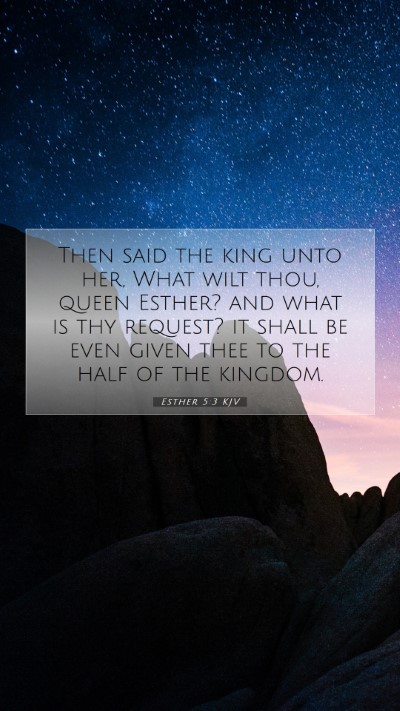Old Testament
Genesis Exodus Leviticus Numbers Deuteronomy Joshua Judges Ruth 1 Samuel 2 Samuel 1 Kings 2 Kings 1 Chronicles 2 Chronicles Ezra Nehemiah Esther Job Psalms Proverbs Ecclesiastes Song of Solomon Isaiah Jeremiah Lamentations Ezekiel Daniel Hosea Joel Amos Obadiah Jonah Micah Nahum Habakkuk Zephaniah Haggai Zechariah MalachiEsther 5:3 Meaning
What is the meaning of Esther 5:3?
Then said the king unto her, What wilt thou, queen Esther? and what is thy request? it shall be even given thee to the half of the kingdom.
Esther 5:3 Bible Verse Meaning
Understanding Esther 5:3
Esther 5:3 states, "Then Esther the queen answered and said, If I have found favor in thy sight, O king, and if it please the king, let my life be given me at my petition, and my people at my request." This verse is rich in meaning and significance, reflecting Esther's courage, the urgency of her plea, and her strategic approach in seeking the king's favor.
Bible Verse Meaning
This passage showcases Esther's bravery and her position as an intercessor not only for herself but for her people. In the context of Esther's story, it illustrates a moment of great risk where she reveals her Jewish identity and seeks the king's protection for her people.
Insights from Public Domain Commentaries
- Matthew Henry's Commentary: Henry emphasizes Esther's wisdom in her approach. By inviting the king to a banquet instead of bluntly asking for her people's salvation, Esther demonstrates a keen understanding of the king's character and the importance of timing in leadership. Esther's humility and dependence on divine providence reflect her faith amidst dire circumstances.
- Albert Barnes' Notes: Barnes points out the significance of favor in Esther's words, showing her acknowledgment of the king's authority and the diplomacy required in her request. He highlights how Esther's request for her life connects to the larger narrative of survival for the Jewish people, marking a pivotal moment in the salvation story of Israel.
- Adam Clarke's Commentary: Clarke focuses on the implications of Esther's plea, suggesting that her request for life speaks to the broader themes of mercy and justice. He indicates that this moment signifies the beginning of Esther's role as a deliverer for her nation, urging readers to recognize the power of advocacy in the face of persecution.
Key Themes in Esther 5:3
- Courage: Esther shows immense bravery in approaching the king uninvited, a practice that could lead to dire consequences.
- Intercession: Her plea represents a cry for mercy, not just for her life but for the lives of her entire people, highlighting the biblical theme of intercessory prayer.
- Divine Providence: The timing of her request suggests that she acts in alignment with God’s plan for her people, emphasizing that divine timing is crucial in moments of crisis.
Application of Esther 5:3
This verse invites contemporary readers to reflect on their own lives and the times they may need to take a stand for justice or advocate for others. It teaches the importance of approaching difficult situations with wisdom, courage, and a prayerful heart.
SEO Keywords and Their Relevance
- Bible verse meanings: Understanding Esther 5:3 provides deep insights into the nature of courage and advocacy in Scripture.
- Bible verse interpretations: This analysis shows how Esther's strategic approach serves as an example of faith and wisdom.
- Bible study insights: Through Esther's story, individuals can learn about the importance of prayer and timing in critical moments.
- In-depth Bible verse analysis: The exploration of Esther 5:3 allows for a deeper understanding of intercession and divine providence.
Related Bible Cross References
- Esther 4:14: "For if you remain completely silent at this time, relief and deliverance will arise for the Jews from another place, but you and your father’s house will perish." This verse highlights Esther's pivotal role.
- James 4:2: "You do not have because you do not ask." This verse underscores the necessity of asking in faith, resonant with Esther's plea.
- Matthew 7:7: "Ask, and it will be given to you; seek, and you will find; knock, and it will be opened to you." It reflects the principle of seeking God's favor and assistance.
Conclusion
Esther 5:3 is a profound verse that encapsulates themes of courage, intercession, and divine timing. As individuals engage with Scripture, the insights gleaned from this passage can inspire actions of advocacy in their own lives, urging them to seek justice and mercy for those in need.


